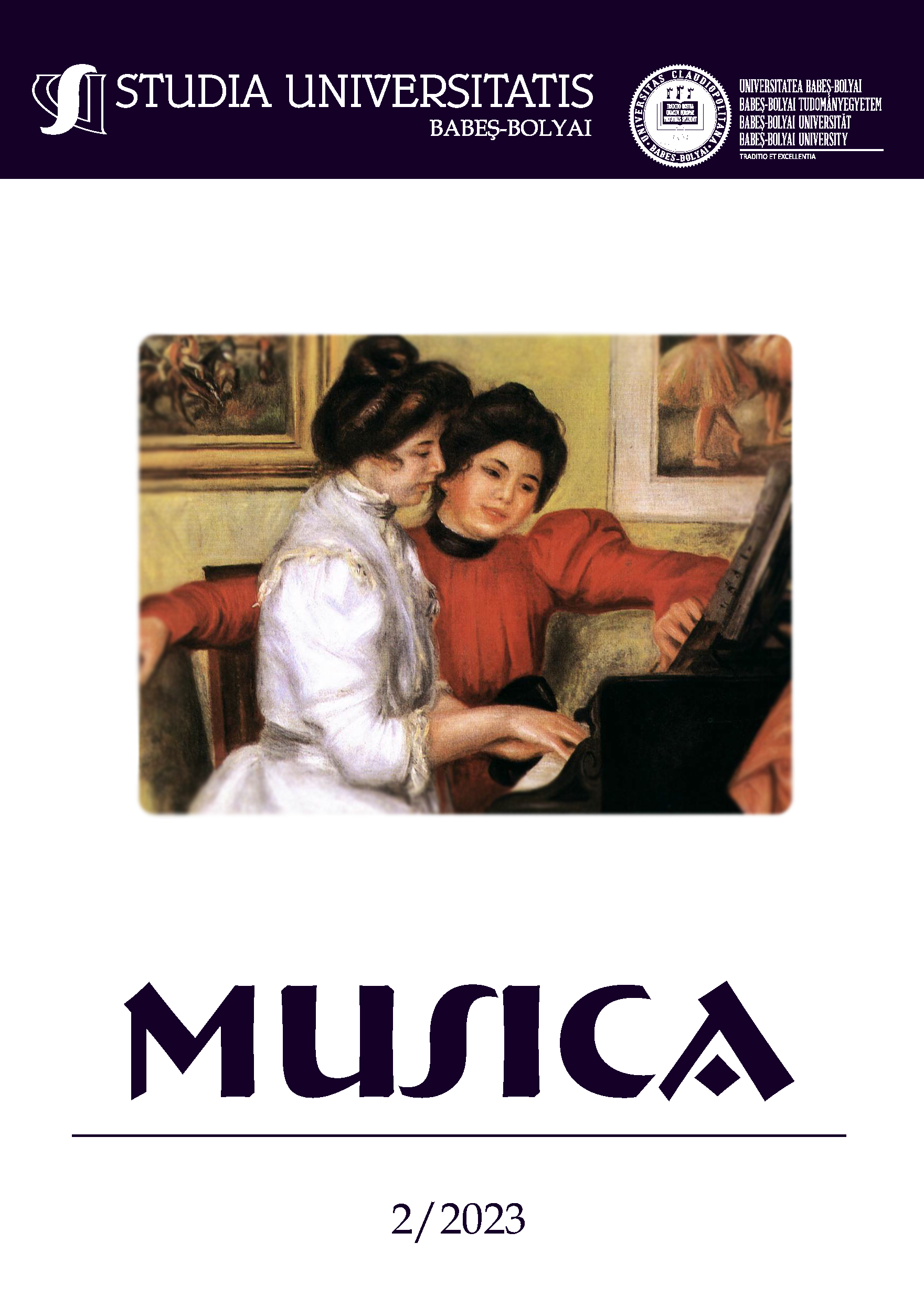Remixing as a Ludus-Component of the Modern Culture
DOI:
https://doi.org/10.24193/subbmusica.2023.2.04Keywords:
principle of remixing, modern culture, remix, play element, Homo Ludens, Homo Modernus.Abstract
The modern development of culture motivates the appearance of new modifications of the play element, based on the concept of Homo Ludens by J. Huizinga. The article substantiates a new scientific concept – remixing as the dominant principle of the organization of artistic matter. A definition of this concept is provided. The specificity of its manifestation is thought over using examples from pop culture, academic musical art (in particular, the creativity of the pianist-composer M.-A. Hamelin, the sketch duo Igudesman & Joo, the Rondo Veneziano orchestra), authentic performance, the opera genre (productions of “Alcina” by G. Handel, “La Cenerentola” by G. Rossini), products of the TV industry. The main vectors of the remixing process are characterized in accordance with the realization of the final artistic goal. The organic nature of the interaction of play logic with the combinatorial thinking of Homo Modernus is revealed.References
“Cinderella (La Cenerentola) | Your Reaction.” Opera North. https://www.youtube.com/watch?v=47MV_aOiKzw (accessed 7 Sept. 2023).
“Did Uptown Funk steal from this 1980s girl group song?” News.com.au, https://www.news.com.au/entertainment/music/did-uptown-funk-steal-from-this-1980s-girl-group-song/news-story/a4cbf0a48b85e1580a3aacabb2bda9fa (accessed 7 Sept. 2023).
“Gioachino Rossini: La Cenerentola.” ALTEA MEDIA / I LOVE TV. https://www.youtube.com/watch?v=HXIgXOJadqk (accessed 7 Sept. 2023).
“Handel 1735 Alcina HWV 34 Andrea Marcon.” Felices Cantus Händel. https://www.youtube.com/watch?v=Q0DtZmvryHo (accessed 7 Sept. 2023).
“LA CENERENTOLA di Gioachino Rossini.” Teatro Comunale Bologna. https://www.youtube.com/watch?v=XyBqgM2jl8I (accessed 7 Sept. 2023).
“Uptown Funk.” WikipediA, https://en.wikipedia.org/wiki/Uptown_Funk (accessed 7 Sept. 2023).
Anfilova, S., Kucherenko, S., Mizitova, A., Pidporinova, K., & Sediuk, I. ““The Own-The Borrowed” in Artistic Culture of the 20th-21st Centuries.” In Journal of History Culture and Art Research, IX(I), 2020, pp. 258-272. https://dx.doi.org/10.7596/taksad.v9i1.2361
Bondarenko, Oleksiy. “Марка Ронсона и Бруно Марса обвиняют в воровстве песни Uptown Funk” (“Mark Ronson and Bruno Mars accused of stealing Uptown Funk song”). Liroom, https://liroom.com.ua/articles/uptown_funk_scandal/ (accessed 7 Sept. 2023).
Chapman, Adam. “Playing Against the Past?: Representing the Play Element of Historical Cultures in Video Games.” In Historia Ludens: The Playing Historian, Routledge, 2019, pp. 133-154. https://doi.org/10.4324/9780429345616
Daniel-Wariya, Joshua. “Rhetorical Strategy and Creative Methodology: Revisiting Homo Ludens.” In Games and Culture, XIV, 6, 2019, pp. 622-638. https://doi.org/10.1177/1555412017721085
Gunkel, David J. “Principi di Remixologia: Una Assiologia per il XXI Secolo e Oltre.” In ODRADEK: Studies in Philosophy of Literature, Aesthetics, and New Media Theories, V, 1, 2019, pp. 411-434. https://odradek.cfs.unipi.it/index.php/odradek/article/view/122
Hamelin, Marc-André. 12 études in all minor keys. for Piano solo [score]. C. F. Peters Corporation, 2010.
Hamelin, Marc-André. Variations on a Theme of Paganini. Piano solo [score]. C. F. Peters Corporation, 2013.
Huizinga, Johan. Homo Ludens: A Study of the Play-Element in Culture. Angelico Press, 2016.
Igudesman & Joo, 2023. http://www.igudesmanandjoo.com/about-igudesman-joo/ (accessed 7 Sept. 2023).
Lambrow, Alexander. “The Seriousness of Play: Johan Huizinga and Carl Schmitt on Play and the Political.” In Games and Culture, XVI, 7, 2021, pp. 820-834. https://doi.org/10.1177/1555412020975619
MAVERMUSIC. https://www.youtube.com/@MAVERMUSIC (accessed 7 Sept. 2023).
McDonald, Peter. ““Homo Ludens”: A Renewed Reading.” In American Journal of Play, XI, 2, 2019, pp. 247-267. https://files.eric.ed.gov/fulltext/EJ1211610.pdf
Ng, Jenna. “The cut between us: Digital remix and the expression of self.” In The Routledge Companion to Cult Cinema, Routledge, 2019, pp. 275-284. https://doi.org/10.4324/9781315668819
Sicart, Miguel. Playing Software: Homo Ludens in Computational Culture. The MIT Press, 2023.
Skyba, Ivan. “Video Game as a Phenomenon of Modern Culture.” In Proceedings of the National Aviation University: Philosophy, Cultural Studies, XXXI, 1, 2020, pp. 163-169. https://doi.org/10.18372/2412-2157.31.14847
Waysdorf, Abby S. “Remix in the age of ubiquitous remix.” In Convergence: The International Journal of Research into New Media Technologies, XXVII, 4, 2021, pp. 1129-1144. https://doi.org/10.1177/1354856521994454
Yosuke, Hayashi. “Dialogue, Conversation, and Disputation as “Play of Logos”: Based on Johan Huizinga’s Homo Ludens.” In Memoirs of Osaka Kyoiku University. Humanities and Social Science, Natural Science, LXVII, 2019, pp. 299-309. DOI: 10.32287/td00031052
Downloads
Published
How to Cite
Issue
Section
License
Copyright (c) 2023 Studia Universitatis Babeș-Bolyai Musica

This work is licensed under a Creative Commons Attribution-NonCommercial-NoDerivatives 4.0 International License.



